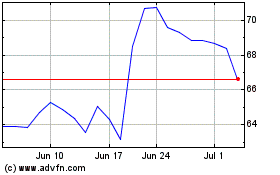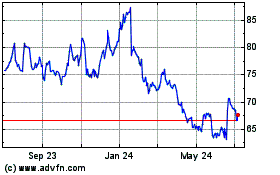UPDATE: Pharmasset Halts Hepatitis C Drug In Mid-Stage Trial
December 16 2011 - 10:14AM
Dow Jones News
Pharmasset Inc. (VRUS) discontinued use of an experimental
hepatitis C drug in a clinical trial because of safety concerns,
but the drug maker said the setback wouldn't derail its planned
sale to Gilead Sciences Inc. (GILD) for nearly $11 billion.
The company discontinued use of a drug code-named PSI-938 in a
mid-stage study of people with hepatitis C infection, citing
"laboratory abnormalities associated with liver function." However,
it will continue testing its lead hepatitis C drug candidate,
PSI-7977, which was the primary selling point behind the Gilead
deal and wasn't associated with the abnormalities.
Pharmasset said the setback doesn't trigger a "key product
event" clause in its sale agreement to Gilead. The Gilead deal was
announced in November and is expected to close next year.
A Gilead spokeswoman couldn't immediately be reached.
The Gilead-Pharmasset deal was striking for placing such a high
premium -- nearly 90% above Pharmasset's stock price before the
deal -- for a company with no products on the market and just over
80 employees. It illustrates the growth commercial potential for
drugs that improve treatment of hepatitis C; Decision Resources
recently predicted the market will soar to $16 billion in 2015 from
$1.7 billion in 2010.
In early trading, Pharmasset shares fell 2% to $125.12, while
Gilead was off 0.2% at $38.40. The Gilead deal values Pharmasset at
$137 per share.
Pharmasset's lead hepatitis C drug, PSI-7977, is known as a
nucleotide polymerase inhibitor and is designed to combat hepatitis
C infection inside liver cells. Gilead and Pharmasset say it has
potential to be part of the first all-oral regimen for hepatitis C.
Current regimens include injectable drugs that can be tough to
tolerate.
Gilead said in November that it hopes for U.S. regulatory
approval of PSI-7977 in 2014.
PSI-938 is similar to PSI-7977, but with certain differences
that led Pharmasset to believe they might be complementary in some
cases.
The mid-stage clinical trial "Quantum" was testing 235 patients
who were receiving PSI-938 alone, or in combination with PSI-7977,
or in combination with both PSI-7977 and another drug called
ribavirin.
"During routine safety monitoring, the company detected
laboratory abnormalities associated with liver function" in people
receiving a 300-milligram dose of PSI-938 once daily, Pharmasset
said.
Pharmasset said there were no abnormalities observed in patients
who received PSI-7977 in the same clinical trial.
ISI Group analyst Mark Schoenebaum said the setback won't
materially affect his view of the sale to Gilead. He said he didn't
include any sales of PSI-938 in his financial models for Pharmasset
and Gilead.
-Peter Loftus, Dow Jones Newswires; +1-215-982-5581;
peter.loftus@dowjones.com
--Tess Stynes contributed to this article.
Gilead Sciences (NASDAQ:GILD)
Historical Stock Chart
From Jun 2024 to Jul 2024

Gilead Sciences (NASDAQ:GILD)
Historical Stock Chart
From Jul 2023 to Jul 2024
